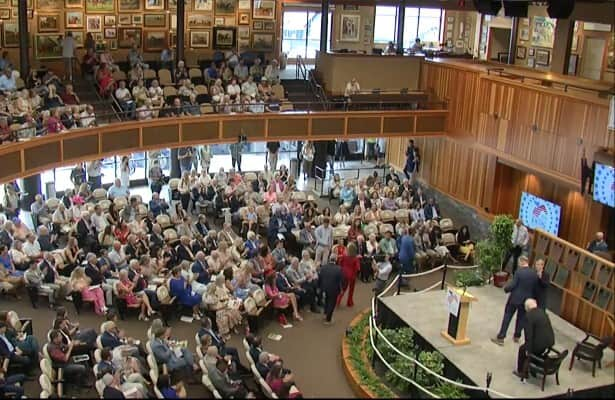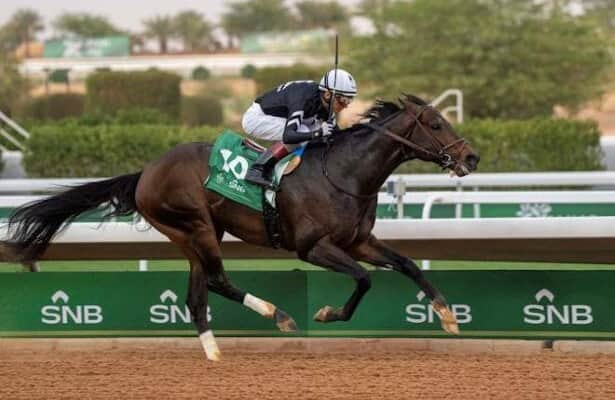Gun Runner, Justify are among 9 Hall of Famers inducted Friday

Nine new members of the National Museum of Racing and Hall of Fame were inducted Friday morning in Saratoga in a ceremony led by longtime New York race caller Tom Durkin.
Inductees in the contemporary category included jockey Joel Rosario, Breeders’ Cup Classic winner Gun Runner and Triple Crown winner Justify. The Historic Review Committee, which considered candidates only from before 1900 in 2024, selected jockey Abe Hawkins, the legendary match race winner Lecomte and inaugural Kentucky Derby winner Aristides. In the Pillars of the Turf division, which honors leaders and pioneers in Thoroughbred racing, Harry F. Guggenheim, Clement L. Hirsch and Joe Hirsch were inducted.
Contemporary
In the contemporary division Rosario, was inducted alongside Gun Runner and Justify. All three were elected to the Hall of Fame in their first year of eligibility.
Rosario was introduced by owner Jose Singer, who like Rosario is from the Dominican Republic. Singer underscored how small the horse racing world is in their home country and how exciting it is for someone from the Dominican Republic to be one of the best in the world in horse racing.
“Joel…started as an apprentice in 2000, very very small school of riders, not like Puerto Rico, Panama, Venezuela, who have great riding schools. There were about three or four or five students at the time. … In the Dominican Republic we have 200 horses running, 100 homebreds and 100 that we import. … It’s a very small community, and that’s what makes it such an astonishing feat.”
Rosario has been riding races in North America since 2003, and in that time has won more than 3,600 races and $322 million in purse earnings. He won the Breeders’ Cup Classic with Accelerate in 2018 and Knicks Go in 2021 and rode stars such as Animal Kingdom, Mind Your Biscuits, Frosted and Close Hatches.
The two contemporary horses inducted in 2024, Gun Runner and Justify, had very different paths to the Hall of Fame.
Gun Runner began racing at age 2 and remained in training until early in his 5-year-old year, when he won the Grade 1 Pegasus World Cup. Gun Runner was represented by principals from each of his racing owners, Ron Winchell of Winchell Thoroughbreds and Rodrigo Torrealba of Three Chimneys Farm.
Winchell underscored the people behind Gun Runner, including trainer Steve Asmussen and jockey Florent Geroux, as key to his success. He also emphasized the importance of staying in training as an older horse as critical to building a Hall of Fame résumé.
“Gun Runner did quite enough where he could have retired as a 3-year-old and had a great career at stud. However, running him as a 4-year-old is what got him to the Hall of Fame.”
Justify’s story was impressive, but much shorter. He did not debut until age 3, and streaked from a debut win to Triple Crown glory in less than four months. “To make the Kentucky Derby after making his first start on Feb. 18, and breaking the curse of Apollo, takes three things: a great horse, a little good fortune and a lot of experience,” said Elliott Walden, president and CEO of co-owner WinStar Farm.
Historic review committee
A common thread ran through the inductions of the jockey and horses selected by the historic review committee: honoring the contributions of Black people in the sport of horse racing.
Jockey Abe Hawkins, best known for riding Lecomte to his historic match-race victory over Lexington, rode from 1851 through 1867. He spent much of his career riding in Louisiana, though after the Civil War he moved north to ride at courses including Saratoga.
Through much of his riding career Hawkins was enslaved by plantation owner and Thoroughbred breeder Duncan Kenner, for whom he rode between 1854 and 1864. Hawkins’s induction speech, given by Ed Brown Society president Clark Williams, discussed the significance of this fact.
“I could not come here today without emphasizing that Abe Hawkins, whose surname Hawkins seems to appear at some point out of nowhere, whose birthplace and birth date are unknown, Abe Hawkins, a man of African descent, earned the honor that is bestowed upon him today during slavery.
“When it comes to the matter of slavery with Abe Hawkins, Ed Brown, Ansel Williamson, and so many others, I submit to us that we cannot adequately refer to people of African descent who were in bondage in America, we ought not refer to them as slaves. … Slavery was their circumstance. Yes, they were enslaved people, but the word slave can never accurately describe who they really were. So, if we wish to call them something, let’s say that they were survivors. Let’s say that they were overcomers. And in the case of Abe Hawkins, we should say that he was a champion, and we should say that he is a legend.”
Williams continued by pointing out how uncommon it was for Black people to be honored the way Abe Hawkins was during his career, citing a Turf, Field and Farm obituary that proclaimed “as a rider and jockey he had no equal in this country. … The death of Old Abe is an irreparable loss.”
One of the horses inducted Friday by selection by the historical review committee was Lecomte, the most famous horse Hawkins ever rode. Lecomte, who went 17: 11-4-1 in a career that ran from 1853 through 1857, was the only horse to defeat Lexington and held American records for one mile and four miles.
The contributions of Black horsemen to the foundations of American horse racing also were highlighted during Friday’s induction of Aristides, winner of the first Kentucky Derby in 1875. His trainer, Hall of Fame inductee Ansel Williamson, and his jockey, Oliver Lewis, both were Black men. In fact, Hawkins rode for Williamson during his career as well, including Travers Stakes and Jersey Derby winner Merrill in 1866.
Though the 2024 selections by the historic review committee considered only the years before 1900, Williams’s induction speech for Hawkins ended with a call to look forward.
“Today some act as though diversity is a bad word,” Williams said. “But hear me when I say, there is no doubt that our sport was at its best in so many ways when this industry possessed more racial diversity in some crucial professional roles where there is very little racial diversity in 2024.
“We must work together, but the other takeaway is that we must do better in our working together.”
Pillars of the turf
The first trio of inductions were in the division of pillars of the turf, reserved for people who made an impact in the sport of horse racing but were not themselves trainers or jockeys.
Two of the three inductees in this division made their mark both in organizing racing associations as well as breeding.
Harry F. Guggenheim raced and bred under the name Cain Hoy Stable, through which he campaigned 1953 Kentucky Derby winner Dark Star and turf champion Bald Eagle. He also bred high-profile horses including champions Crafty Admiral and Never Bend.
On the organizational side, Guggenheim worked with John W. Hanes and Christopher T. Chenery to create a plan for a nonprofit under which to reorganize racing in New York State. This work led to the establishment of the New York Racing Association.
Another of Friday’s inductees, Clement L. Hirsch, co-founded the Oak Tree Racing Association, which took over the mantle of hosting a fall meet at Santa Anita Park after Del Mar canceled its fall racing meet in 1968.
Major horses owned by Hirsch include Figonero and Magical Maiden. The influence of Magical Maiden remains to this day, as she is the granddam of Papa Clem as well as 2021 Breeders’ Cup Filly & Mare Sprint winner Ce Ce, both of whom were campaigned by Bo Hirsch, Clement Hirsch’s son.
The final inductee in the pillars of the turf section is turf writer Joe Hirsch, who began his journalism at the New York Times before working at Daily Racing Form from 1954 through 2003.
When asked who he was rooting for, Hirsch was known for responding, “The best story.” Well befitting that, Hirsch’s induction into the Hall of Fame was full of stories about him, including from Durkin and Joe Namath.
Hirsch’s nephew Jonathan Sokolow summarized his significance and the importance of writing and words in the history of horse racing. “Man o’ War. Citation. Native Dancer. Gallant Man. Round Table. Bold Ruler. Kelso. Dr. Fager. Mr. Prospector. Forego. Secretariat. Ruffian. Those were all just words until they were affixed to immortal horse gods. In the sport of kings, word is king, and turf writers, they are the kings of word.”
Related
Saudi undercard: Straight No Chaser wins 1 of 5 graded…
Straight No Chaser arrived from America with the billing as one of the major equine attractions of this year’s Saudi Cup meeting. He duly dazzled in the Grou
American Reporter Snubs Kentucky Derby and California for Non-USA Horse…
Do you recall when Mike Repole gave an early warning to the American horse racing industry? The American businessman remarked, “You’re not a national sport
Saudi Cup Top Contenders: RATTLE N ROLL
In the days leading up to Saturday’s $20 million Saudi Cup at King Abdulaziz Racecourse in Riyadh, usracing.com is posting profiles of the leading cont
Saudi Cup: Forever Young Draws Outside, Romantic Warrior Inside
For a horse race billed as the richest in the world, there sure doesn’t seem to be much buzz around the $20 million Saudi Cup (G1) in Riyadh, Saudi Ara













